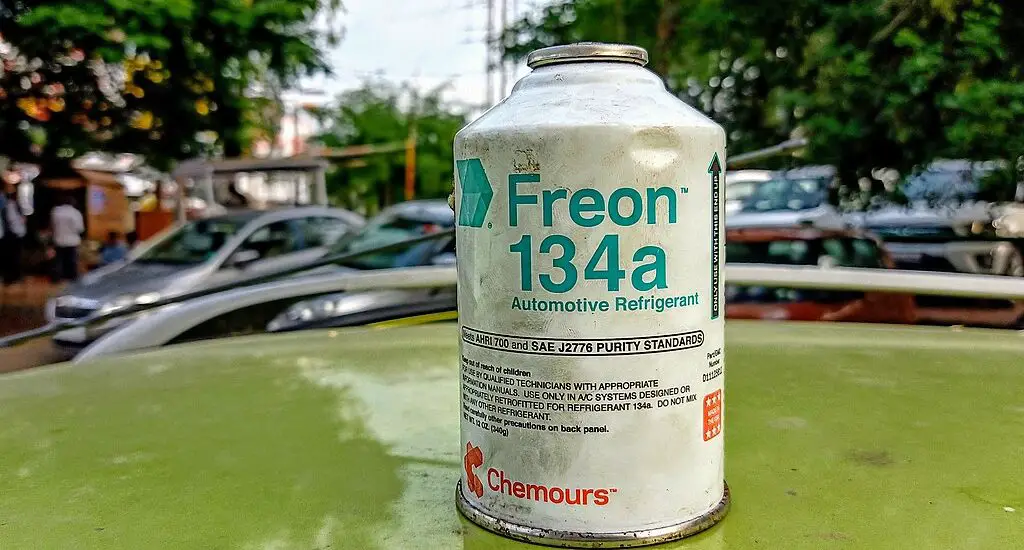This in-depth guide reveals what happens if freon leaks. We’ll discuss the effects of freon leaks on our appliances, health, and environment.

Table of Contents
Does Freon Leak as a Liquid?
Understanding the physical state of freon during a leak is crucial for effective response and safety measures. Freon, a term often used to describe various refrigerants, can leak in both liquid and gaseous states. This state depends on the conditions within the cooling system, such as pressure and temperature.
In high-pressure areas, like the condenser or liquid lines, freon is more likely to leak as a liquid. Conversely, in low-pressure areas, such as the evaporator or suction lines, it’s more likely to be in a gaseous state.
Recognizing the state of the freon helps in determining the severity of the leak and the necessary safety precautions. For instance, liquid leaks can be more rapidly damaging to the system and potentially more hazardous due to their concentrated nature.
What Happens If Freon Leaks?
So, what happens if freon leaks? Here are some of the effects of freon leak.
The Immediate Effects of a Freon Leak
When freon escapes from a refrigeration or air conditioning system, several immediate effects can be observed. The most noticeable is a reduction in the system’s cooling efficiency. This happens because freon is essential for the heat exchange process that cools air or refrigerated spaces.
Signs of reduced efficiency include the air conditioner struggling to maintain desired temperatures or a refrigerator taking longer to cool contents. In enclosed spaces, a significant freon leak can lead to oxygen displacement, creating a suffocation hazard.
In addition, if the leaked freon reaches the atmosphere, it can contribute to environmental damage, particularly ozone layer depletion. Immediate action, such as ventilating the area and shutting down the system, is necessary to mitigate these effects.
Health and Environmental Risks
The health risks associated with freon leaks are significant, especially in poorly ventilated areas. Inhalation of freon can lead to a range of symptoms, from mild headaches and dizziness to severe respiratory distress and skin irritation. Prolonged exposure can result in more serious conditions like asphyxiation or poisoning, particularly in high concentrations.
Environmentally, freon’s impact is equally concerning. Certain types of freon, particularly chlorofluorocarbons (CFCs) and hydrochlorofluorocarbons (HCFCs) are known to deplete the ozone layer, which is vital for protecting the Earth from harmful ultraviolet radiation.
These substances are also potent greenhouse gases, contributing to global warming. The environmental risks underscore the importance of responsible freon management and adherence to regulations that phase out ozone-depleting substances.
Long-Term Consequences of Unaddressed Leaks
Unaddressed freon leaks can lead to several long-term consequences. Continual freon loss reduces the efficiency of refrigeration and air conditioning systems, leading to higher energy consumption and costs.
Over time, the strain on the compressor and other components due to low refrigerant levels can cause wear and tear. This can lead to system breakdowns and costly repairs or replacements.
From an environmental perspective, ongoing leaks contribute to the continuous release of harmful gases into the atmosphere. This can worsen issues like ozone depletion and global warming.
Furthermore, if leaks occur indoors, prolonged exposure to freon can pose chronic health risks to occupants. Regular inspections and maintenance are vital to prevent these long-term consequences.
Prevention and Maintenance Strategies
Preventing freon leaks involves proactive maintenance and awareness. Regularly scheduled inspections of refrigeration and air conditioning systems are crucial.
During these inspections, technicians should check for potential leak points, such as worn seals, loose fittings, and corroded components. Ensuring that all repairs and installations are performed by qualified professionals is also key, as improper handling can lead to leaks.
Being aware of the common causes of freon leaks, such as physical damage, corrosion, and overpressure, helps in taking preventive actions.
In addition, upgrading older systems that use ozone-depleting refrigerants to newer, more environmentally friendly options can reduce the risk of harmful leaks. Educating users and technicians about the importance of refrigerant management and the environmental impact of refrigerants is also a vital part of prevention.
Professional Response to Freon Leaks
In the event of a freon leak, it is imperative to involve a professional HVAC technician. These experts are equipped with specialized tools, like electronic leak detectors and UV dyes, to accurately locate and assess the leak.
Once identified, they can safely repair the leak, ensuring the refrigerant is properly contained and the system is restored to optimal operation. Professional handling is not only about fixing the immediate problem but also about adhering to environmental and safety regulations.
Technicians can also provide valuable guidance on preventing future leaks and optimizing the performance of the system. In cases where the system uses outdated refrigerants, they can advise on suitable, environmentally friendly replacements.
Relying on professional expertise is the safest and most responsible approach to addressing freon leaks.